Freaks (1932)
Directed by: Tod Browning
Written by: Al Boasberg, Charles MacArthur, Edgar Allan Woolf, Leon Gordon, Willis Goldbeck
Starring: Harry Earles, Henry Victor, Olga Baclanova, Wallace Ford
USA
AVAILABLE ON DVD
RUNNING TIME: 64 mins
REVIEWED BY: Dr Lenera
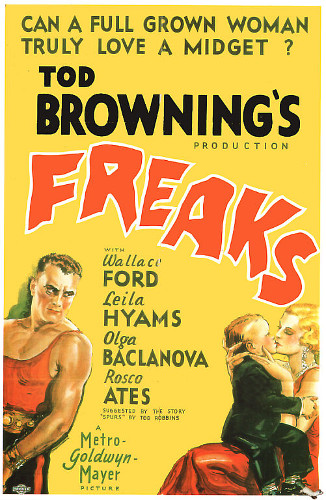
At Madame Tetrallini’s sideshow, its ‘attractions’ are exploited to be gawped at, mocked and treated with revulsion by the general public, but also form friendships with each other, have relationships, give birth – just as anywhere else. One of the most popular performers is trapeze artist Cleopatra, whom midget Hans become besotted with despite his midget fiancee Frieda. Cleopatra doesn’t return his love, but plays along so she can get money and gifts off him. Then she hooks up with Hercules the strongman, and the two come up with a wicked plot despite seemingly being ignorant of a certain pact between all the ‘freaks’….
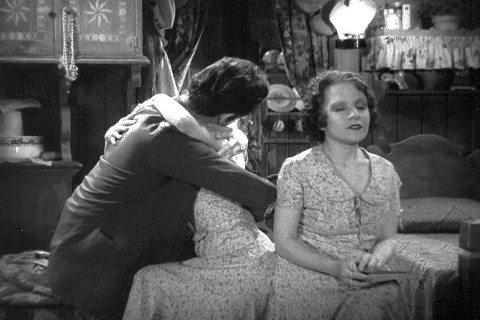
“Give us something to out-horror Frankenstein” said producer Irving Thalberg to director Tod Browning, but Tod obliged so much that the result sickened many and what probably seemed like an attack on Hollywood’s glamour and beauty which asked Depression audiences to identify not with the Beautiful People but with the ultimate underclass, became one of the most controversial films of the 1930’s. In the UK it was banned for a whopping thirty years! What’s most surprising about it when watched today is that, really, it isn’t a horror film, at least until the towards the end, though it was considered to be one when it was shot and released because it dared to give audiences an unflinching look at what audiences just didn’t want to look at back then – circus ‘freaks”, and – more than that – it treated them sympathetically and even looked at their sexuality. It’s possible that the film would have caused less of a fuss if it had presented them as simple figures of fear and revulsion, because that’s not just what folk of the time were more used to, and how a great many people thought about those born with physical abnormalities. Seen today, its compassionate yet realistic depiction of its ‘freaks’ seems quite progressive, though I’m not sure that a modern film of a a similar nature would be much better received. We may hate ourselves for feeling this way, but seeing these kinds of characters can’t help but make us feel uncomfortable. But then again it probably wouldn’t even get made today anyway, seeing how there seems to be less and less variety of films being green lit. I caught up with Freaks quite late in the day and recall being disappointed that this supposed shocker of a film was actually part melodrama and part almost documentary-style look at the lives of those in a circus. But re-watching it since hammered home to me what a remarkable piece of work it is, its huge heart overshadowing what was actually a bit stilted and static even for 1932. And it really is absolutely loaded with sexual content!
It was loosely based on a short story called Spurs by Tod Robbins which was purchased by MGM in 1926 at Browning’s request, after an adaptation had been proposed to him by midget actor Harry Earles who’d appeared in Browning’s The Unholy Three, and who hoped would star. While Willis Goldbeck and Elliott Clawson were the main screenwriters, Leon Gordon, Edgar Allan Woolf, Al Boasberg and an uncredited Charles MacArthur would also contribute. Victor McLaglen, Myrna Loy and Jean Harlow were slated to play Hercules, Cleopatra and Venus respectively, but Loy thought the script to be revolting and Thalberg decided in the end not to use any major stars. Despite Olga Baclanova [Cleopatra] recalling how she befriended the disabled performers, they all had to eat in a separate room so that “people could get to eat in the commissary without throwing up”. Studio head Louis B. Mayer tried to get the production shut down but Thalberg resisted and kept it going. Test screenings had viewers fainting or running [rather than walking] out, and one woman threatened to sue MGM, claiming the film had caused her to suffer a miscarriage. The 90-minute movie was cut down by nearly half an hour, removing some comedy [surely that would have lightened things for viewers?] and criticism of ‘normal’ humans, most of the climax and part of the epilogue which had Hercules singing in a falsetto implying that he’d been castrated. I’d like to see this missing footage even more thank, say, the cut material from The Magnificent Ambersons, but it’s all lost. A new framing device featuring a carnival barker was added, as was a final scene of reconciliation, though the latter only appeared on some prints. Despite all this truncation, audiences and critics were still repulsed. In some American states it’s still technically illegal to show it.
We begin with the barker luring in people with such sensitive lines as, “we told you we had living, breathing monstrosities”, though he does finish off with, “offend one and you’ll offend them all”, which is quite obviously settings things up though it’s easy to forget that we heard it when we’re so surprised by what we’re watching. The punters flood in and crowd round one particular enclosure, though we don’t see who or what is inside it. One woman screams as the barker says that we will now learn how this being came to be. She was originally Cleopatra a trapeze artist, and we see watching her with adoring eyes is little Hans. His fiancee Frieda notices this, and Hans says that he only has eyes for her, but we know that he’s lying. From then on he’s constantly plying her with gifts and even giving her money when she asks for some, and it’s really painful to see this more chap being used in this manner, though one really wants to give him a few slaps and hope that they knock some sense into him. After all, the attempts by several others to talk him round don’t achieve anything. It’s also painful when we venture into some nearby countryside and see one man complaining to another about how he saw, “a lot of horrible, twisted things” and that, “there must be a law in France to smother such things at birth”, and not just because we hate the man for saying these things. It’s also because most of us, even if we hopefully wouldn’t go as far to utter that second comment, would have felt uncomfortable and even revolted at seeing a few ‘freaks’, most of whom are children, out playing innocently. The second man tells Madame Tetrallini that her charges can stay.
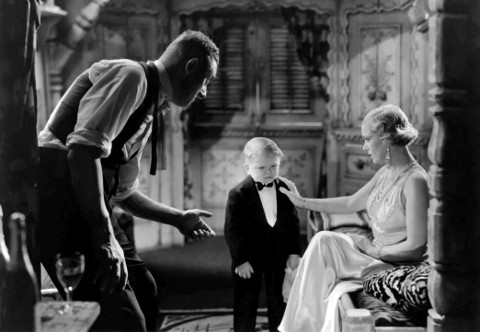
What’s interesting after this is that we don’t see any more members of the public; everything takes place inside the environment of the carnival, which of course humanises the ‘freaks’ in our eyes even more. They’re all tolerated by the ‘normal’ people; some are mocked by them, but are not given anything near the treatment that they’d get if, for example, they ventured into the nearest town. Of course the largest focus is Cleopatra and Hans. Cleopatra is soon in a relationship with strongman Hercules though Hans doesn’t know it. Silly Hans then spills out that he has a large inheritance, so Cleopatra and Hercules think up a plan to have the former marry Hans, whom they will then kill so they get all this money. It’s this storyline which drives the plot forward and sets off the climax, but it’s certainly not all that’s going on as we are privy to much else, often just people going about their daily lives; things like eating dinner and rolling cigarettes aren’t a problem to do even if you have no arms. Then you have the Bearded Lady who’s in a relationship with the Human Skeleton and has just given birth to their daughter. Violet, a conjoined twin whose sister Daisy is married to Roscoe the stuttering circus clown, becomes engaged to the circus’s unnamed owner. The ‘normal’ seal trainer Venus walks out on Hercules who finds the welcoming arms of Cleopatra while Venus becomes closer to Phroso, another circus clown even though Venus fails to find his jokes funny. And the likes of Schlitie a microcephalic boy who wears a dress, the intersex Josephine Joseph, the totally limbless Prince Randian and Koo-Koo the Bird Girl who has bird-headed dwarfism are often around and are all given their moments to shine. But the emphasis gradually narrows to focus on Cleopatra and Hans, and finally the ‘freaks’ going into action where suddenly it’s night time and we’re in horror mode.
Our avengers are shot to look as menacing as possible, especially when crawling in the pouring rain after their prey in a nightmarish image of horror which haunts the brain. One could argue that this is a betrayal of the attitude of what comes before, but it seems that me that what’s being said to us is, “want to now see these freaks as the usual figures of horror? – well here you are, and sweet nightmares!” I enjoy the sight of them about to wreck revenge too much to be that bothered about it. What bothers me more is the way the scene is suddenly cut away from because of the editing. Yet when we see what’s been done to Cleopatra, it’s truly grotesque; the flaws of the costume are only evident if you look at screen shots or pause the DVD, and even then the idea of what exactly has been done is really horrible even if it’s impossible unless the ‘freaks’ had all been students of Dr. Moreau. But then I sometimes wonder if the character is meant to be wearing a costume because she’s been so mutilated, a possibility which is almost as nasty. And it takes further the theme of something being human but in a form that doesn’t look human, a theme most beautifully shown in a really heartwarming scene involving Schlitze. Phroso compliments him on his new dress and Schlitze is utterly charmed, his display of happiness overriding any negative feelings we still may have about his appearance. But soon after this is that terrific dinner scene where everyone is celebrating the wedding. Both normal and abnormal people all seem to be on the same level and enjoying each other’s company. Cleopatra gets drunk and can’t resist snogging Hercules, but only Hans notices this, as his kinfolk begin to sing a song that welcomes her as, an outsider, as one of them. It’s a bit creepy and may unnerve some first-time modern viewers in the wrong way as it suddenly makes the ‘freaks’ a bit sinister for a couple of minutes, but why shouldn’t these outcasts from ‘normal’ society have some self-respect and consider it an honour for a ‘normal ‘person to be welcomed into their group?
In a reminder of how tame things became only two years ago in American cinema when the Production Code significantly tightened its grip, the emphasis is on sex, Browning and the writers seemingly not so much intrigued but actually turned on by the idea of the ‘freaks’ having normal sex drives, which is perhaps little surprise if you consider the surprising number of Browning films which have suggestions of father-daughter incest in them. Sometimes other characters mock them, but then don’t we too find this kind of thing morbidly amusing even if we don’t want to and even know that we shouldn’t? Josephine Joseph is taunted with lines like, “I think she likes you, but he doesn’t”. Violet and Daisy the conjoined twins each have partners which really does get one thinking about things like group sex, while the fact that one feels what the other one feels is an opportunity for lines such as, “I’m not going to have your wife in bed with my hangover”. I’m not entirely sure that Cleopatra and Hans are actually doing it, but they still can’t help but conjure up thoughts of an adult and a child together even while we hate ourselves for thinking this way. There is one ‘normal ‘relationship, but even that has one strange exchange which may have been clarified in the original cut though may also have been put in just to add one more bit of oddness. “You’re a pretty good kid” Venus tells Phroso who replies, “You’re darn right I am, you should have caught me before my operation”. The mind boggles.
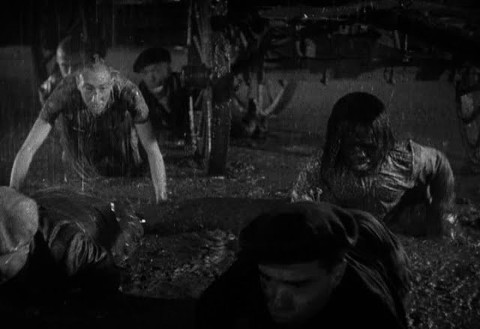
Olga Baclanova is very hammy but undeniably fun to watch as a cruel, heartless tramp, pretty on the outside, hideously ugly on the inside. Earle’s performance as Hans is initially awful but improves, especially when he mimics Cleopatra’s words seemingly as much for the benefit of the viewer as himself, making one wonder if they shot this film chronologically. Frieda is played by Harry’s sister Daisy Earles which explains why there’s no sense of sexuality in their relationship – not even Browning would have been willing to go that far! She’s extremely awkward in her line delivery and some of the other ‘freaks’ show distinct uneasiness in front of the camera, but then none of them were professional actors except for Angelo Rossitto who’d already been in some films with Lon Chaney and then went on to a have a very lengthy career up to the mid-’80s. It’s probably worth saying that many of the others regretted appearing in this film, though that may have been more due to the reception it got more than anything else, a reception that probably confirmed the awful way they were regarded by most. As usual, Browning’s direction is mostly static and it only properly comes to life towards the end where it almost seems like we’re suddenly watching a different film altogether. But there’s some cleverness in some of the imagery, such as Cleopatra looking deformed herself several times because of the way that she’s reclining on a settee. And Freaks is one of those one-of-a-kind films that almost transcend some flaws because of what it is and what it’s saying. Since 1932 there have been many efforts that challenge us to really look at ourselves and question the idea of what is more monstrous; the thing that is monstrous in appearance or the person that classes said thing as monstrous. But few seem to take us closer to the ‘other’ , and an ‘other’ that really exists and which isn’t some fantasy creature, than Freaks. It’s not an all-time classic, but it’s rather extraordinary nonetheless.
Rating: 











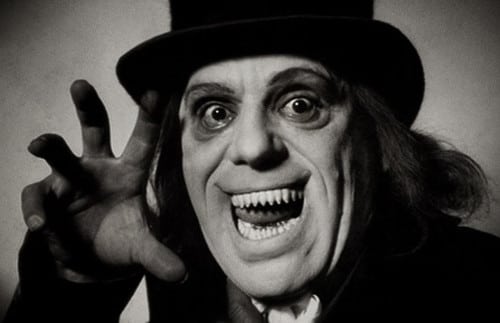
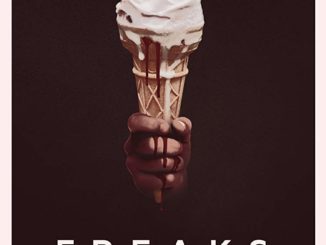
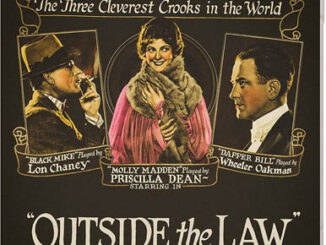
Be the first to comment